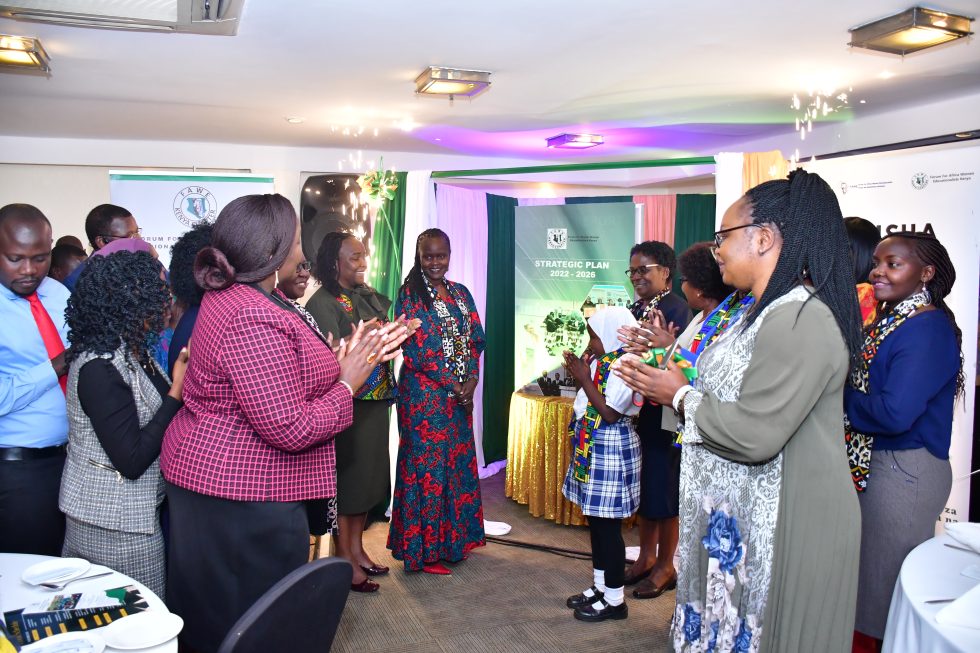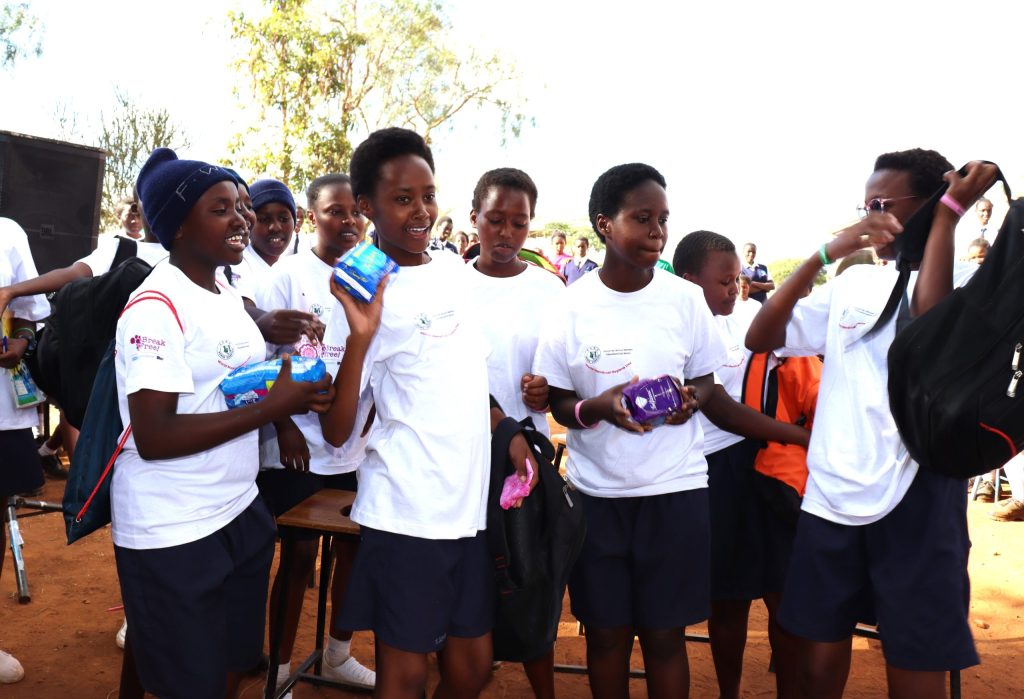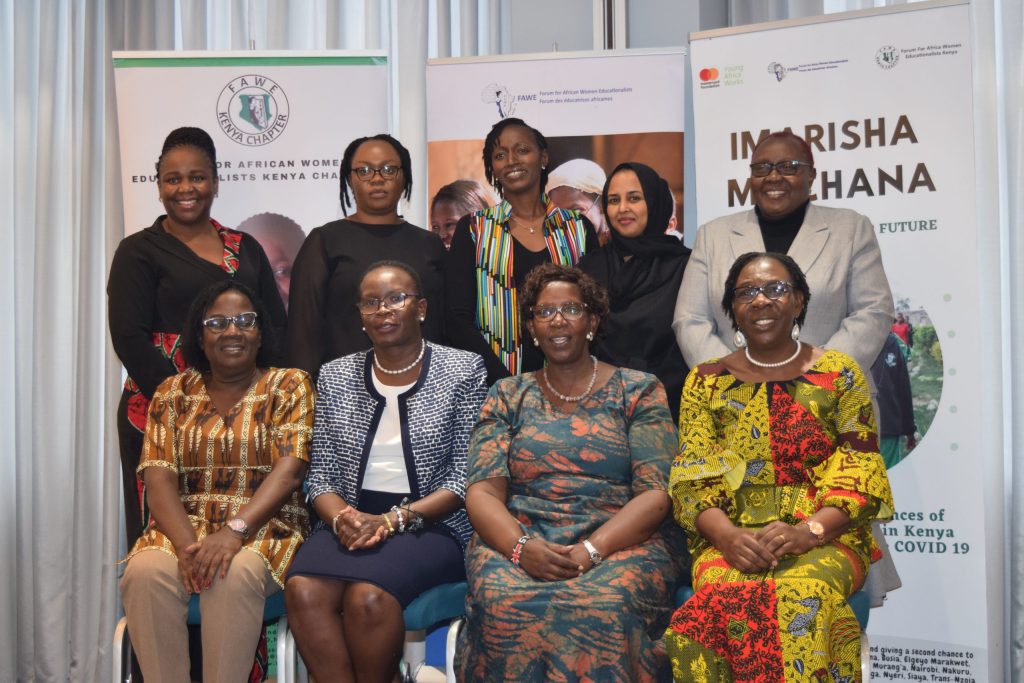Forum for African Women Educationalists, Kenya Chapter (FAWEK) launch their new Strategic Plan (2022-2026)

The Forum for African Women Educationalists, Kenya Chapter launched their Strategic Plan (2022-2026) on 11th October 2022. The day that coincided with the ‘International Day of the Girl Child’ also marked the 26th anniversary since the organization started. Speaking during the launch, Dr. Sara Ruto, the Chief Administrative Secretary, Ministry of Education, who was our chief guest noted that the new strategic plan denoted continuity, renewal and focus. “Have we made much gains now that we are a quarter of a century, you can look back, interrogate what you have done, what the missed opportunities were and correct them in strategizing for the future,” she challenged FAWEK and her leadership. Other notable guests included Homabay Woman Member of parliament Joyce Atieno Bensuda, Kiambu Woman Member of Parliament Ann Wamuratha, and Migori County First lady Agnes Ochilo who congratulated the organization for the milestone and challenged for inclusion of more counties in the programs being rolled out. The new strategic plan (2022-2026) is aimed at increasing the visibility of the organization that has championed for girl’s education and women empowerment in Kenya for almost three decades. It will also seek to showcase the plan of the organization to donors, investors, stakeholders and the private sector for possible collaboration, partnerships and funding. Furthermore, the strategic plan will serve to assess the strengths and weaknesses of the organization’s approach and consider the internal and external factors that influence the trajectory of her work. The next five years will see an effective implementation as well as sustainability of her mandate. The strategic plan will endeavor to achieve a couple of things identified as key result areas within the plan: Access to quality education and training opportunities for women and girls Integrating gender responsive approaches and policies in the Kenyan Education system Advocacy and partnership on education for women and girls Positioning FAWEK as a repository for girl child education in Kenya Resource mobilization and management for women and girl’s education FAWEK organizational capacity enhancement FAWEK stakeholder engagement By Philip Makori (Communications and Advocacy Officer)
Celebrating International Women’s Day 2023!

On March 8, the world celebrated International Women’s Day 2023, themed “DigitAll: Innovation and technology for gender equality.” With the goal of embracing and championing equality, the world celebrated women and girls utilizing the digital space to address social and economic inequalities through innovations and digital education. FAWEK, in partnership with several county governments, marked the day with various activities addressing inequalities and how they can use the digital space to champion for women’s equality and representation in key decision-making. In Trans-Nzoia County, FAWEK and other partners celebrated this day at Kitale Social Hall, where Her Excellency, the Deputy Governor of Trans-Nzoia County, Philomenah Bineah, was the chief guest. Prior to the gathering, the County Commissioner and the Police Commander, Trans-Nzoia County, led a procession in town to mark the event The Deputy Governor of Trans-Nzoia County, Philomenah Bineah giving her remarks during IWD celebrations in Kitale Social Hall. In her speech, the chief guest, H.E. Philomenah, appreciated the digital space for supporting women in business through digital marketing, health, and security sectors. “Women and girls must be able to engage, create, learn, and work safely and productively either online or offline, making the most of all the opportunities in every sphere of life and at every stage, in education, economy, society, and in politics,” said the Deputy Governor. FAWEK is working with the county government to empower women through initiatives like Imarisha Msichana not only to give girls and teenage mothers opportunities for re-entry in schools but create a society with equal opportunities for both men and women free of all forms of gender-based violence. H. E. the First Lady of Narok County leading a procession in Narok to mark this year’s IWD celebration. In Narok County, H. E. the First Lady also reiterated the issues facing women and encouraged the them to stand up for what would uplift their social status. She encouraged participants to work together to create an environment where men and women are allowed to participate in and make decisions regardless of their gender. “The county government is working to ensure that gender equality is attained and the people of Narok County, including women, are given an opportunity to be part of the team that journeys towards transformation using digital technology.” Other counties that FAWEK partnered with to celebrate International Women’s Day include Kakamega, Busia, and Turkana. In all these activities, one thing was clear: “When barriers to power and leadership are broken, there’s real equality.”
Keep Her Safe

“Education holds the key to a better life and better society; a life with less poverty and better health’’ Written by: The Nairobi – Girls Education in Emergencies Advocacy Working Group Education is critical in empowering and transforming the lives of young people, especially girls, yet widespread Sexual Gender-Based Violence (SGBV) in and around schools seriously undermines the achievement of high-quality, inclusive, and equitable education for vulnerable girls. The education Sustainable Development Goal (SDG 4) which aims to ensure inclusive and equitable quality education and promote lifelong learning opportunities for all will never be achieved without understanding and reducing the barriers to girls’ education in fragile, conflict and crisis settings. While the Kenyan government has created policies that offer equal opportunities to all, it has paid much less attention to the way policy is converted into action. Girls retention and completion rates in both primary and secondary schools remain significantly low. For instance, in secondary school enrolment and completion rates, there are 48.4% girls against 51.6% boys who are enrolled, and only 37% of girls complete their secondary education as opposed to 46% of boys (Catherine k et.al, 2015). This clearly depicts that girls are disproportionately disadvantaged in education and it is even worse for the girls living in emergencies settings in Kenya. With the aim of improving the learning outcomes for women and girls in Kenya, FAWE Kenya is promoting the effective use of data and evidence to advocate for reforms in girls’ education. 25 women rights organizations, duty bearers, and policymakers were capacity-built on data-driven advocacy skills in May 2021 and consequently, a working group in Nairobi was formed. The group is using quality data and evidence to influence key decision-makers to address the persistent constraints that hinder girls from effective participation in education in Kenya. The Nairobi working group has developed an advocacy strategy with a key message on ‘’Keep Her Safe’’ which seeks to end sexual gender-based violence in schools within Eastleigh, Nairobi County. During a convening held in September 2021, stakeholders from the Ministry of Education, State Department for Gender, and CSOs came together to advocate for policy change, with most GBV cases being witnessed in these areas. It’s a menace that’s really destroying the future of the girls. We are targeting emergencies settings such as Eastleigh in Nairobi, where most of the girls are refugees and vulnerable. We are advocating for the signing of the Nairobi County GBV Control and Management Bill, into an Act by the Nairobi City County Assembly. We have developed a GBV Prevention and Management Strategy using an evidence-based approach because this will ensure a smooth running of our advocacy in addressing GBV cases in schools. The Government has been slow in responding to policy measures and actions related to stemming the rise in Sexual Gender-Based Violence (SGBV) especially that affecting school-going adolescent girls. The act and the Strategy will augment the work of the civil society in the County. Recent research indicates that there are 67,267 refugees living in Nairobi County, and the majority are in the Eastleigh area (Against the odds: refugee integration in Kenya, December 2018). Many of the refugee girls are out of school or have had their education disrupted, because of war and disaster. These girls are in the most desperate need of educational support. Gender gaps exist at every level, with a mere 7% of girls continuing to secondary education as opposed to 22% boys. Only half of the refugee girls attend primary school, and less than a quarter are in secondary school. According to McGovern 2021, in the past year, SGBV among adolescents and young women has doubled from 2.5-5.0% resulting to an increase in teenage pregnancies and school dropouts in Nairobi County. Further, according to a recent case study conducted by FAWE Kenya in Eastleigh, Nairobi County, 57% of the girls have experienced violence in one form or another. They have also been exposed to child labor and child marriages owing to the extreme poverty that they live in. This has been exacerbated by a lack of policy, rules, and guidelines governing SGBV cases in schools, inadequate knowledge of sexual reproductive health information, negative perception towards girls’ education and harmful cultural beliefs and norms. The benefits of our advocacy issue are that there will be enhanced student safety in schools within Nairobi County, increased retention in schools and increased awareness on SGBV in schools within Nairobi County. Unlocking the power of education for all, including those in crisis-affected contexts, requires the development of education systems that are more resilient and responsive in the face of crisis.
Silent suffering: Kenyan girls missing out on education

By Monica Mararo Crises can exacerbate the hurdles girls face in education, including sexual and gender-based violence, teenage pregnancy and child marriage. In Kenya, girls from Turkana host communities and urban refugee girls in Eastleigh informal settlement, Nairobi, are disadvantaged at all stages of education and struggle to learn given the high levels of vulnerabilities. In these fragile and crisis-affected contexts, more than any other, girls’ education is a lifeline. Unfortunately, many girls remain out of school. Our girls are being failed with gender-related barriers in education pushing them even further behind. Due to the nature of rampant conflict and crises affecting these communities, they have sunk deeper into poverty, making it harder to afford to send them to school. At the advent of Covid 19, the Government of Kenya announced the closure of schools and educational institutions as a precautionary measure to mitigate the risk of human-to-human transmission of Covid 19, to protect children from being affected and to minimize the spread of the virus in the community. So much has transpired since Covid 19 hit the country. The pandemic adverse effects affected girls more than boys. During the school lockdown, girls lacked food and sanitary towels, which then, were provided by schools and NGOs. They also did not learn. Most were unable to access learning materials while at home and other learning channels were unavailable. For instance, most parents do not have radios hence girls did not benefit from the school radio programs by the Kenya Institute of Curriculum Development (KICD). In addition, due to the poverty and lack of internet connectivity, most girls had no computers or smartphones to enable them attend classes. From the case study conducted by FAWE Kenya, Turkana County does very poorly in keeping girls in school once they are enrolled. There is a dramatic fall in the number of girls as they progress in subsequent classes. In 2020, for instance, 700 girls sat for KCPE against 997 boys, implying more boys completed primary school compared to girls in the host community. The rural based host community of Turkana have negative attitude towards girls’ education. They believe that girls’ education is optional and not compulsory. They therefore, prefer to take boys to school and have girls stay at home providing labor such as looking at goats and caring for household chores. Significantly, they see girls as a source of wealth hence no value in educating them. Their focus is to get girls married off for them to get family wealth. They see girls as “Equity Bank or any other bank” where they can save income. Male parents believe that girls belong to them and it is their prerogative right to decide when and which girl is to be beaded and married off. Consequently, they insist on marrying off girls at a tender age in exchange of cows, and camels, which should belong to them. Moreover, they perceive schools as a place where girls are introduced to “foreign cultures” such as sex, abortion, use of drugs, and graduate with pregnancy which do not occur if they stay at home. Other factors affecting learner achievements for girls in the Turkana host community include inadequate teachers, language barrier, inadequate female teachers, inadequate learning facilities, poor attitude towards education, girls’ indiscipline and lack of role models. Many girls experience violence and extremism in and out of school. The common belief that girls must be canned to instill discipline and that it is not an abuse but a normal experience that every girl must undergo has exposed many girls to violence. Girls are also disadvantaged by the culturally defined gender-biased roles. Girls must do household chores such as washing, cooking, fetching water, and selling firewood or charcoal. These chores are often full-time engaging and commit girls to the point that they have little or no time to study unlike boys who are supported to go to school and study. FAWE Kenya works to ensure that all girls access education and this promotes stability among vulnerable girls. Educated girls are equipped with tools for resolving disputes peacefully, and are more productive. Quality education has been shown to promote tolerance and help resist recruitment to violent extremism. When families are forced to flee for safety, young girls miss out on education. For instance, many urban refugee girls and families have fled Somalia due to forced recruitment and abduction of children to the conflict and found themselves in Eastleigh, Nairobi. Most of the urban refugee girls in Eastleigh fled their countries, at a tender age. Majority 30.8%, were forced to flee to Kenya because of fear of abduction by militias, while 26.9% were forced out of their countries by war and internal violence. Most of these girls were looking for peace since their home countries are war- torn areas. Some of the girls were looking for education. Some were looking for employment, and greener pastures, especially those from Congo. Besides war and persecution, some urban refugee girls feared early marriage and female genital mutilation, a common practice in their home countries. In Eastleigh Nairobi, school-going girls who have been forcibly displaced have been barred from education because they lack official documentation. There are only six public schools, and a couple of private schools that enroll urban refugee girls and are characterized by overcrowded classrooms and teachers do not have the requisite skills to deal with refugees. Lack of legal status, especially necessary documentation such as ID or birth certificate or proof of prior learning, required for one to register in a school is a major barrier for urban refugee girls to access school. The presence of refugee girls in Eastleigh have resulted in influx of private schools because of inability of the public schools to absorb and enroll all of them. The urban refugee girls lack transportation options for accessing schools safely with 59% mentioning distance to school as a major barrier to schooling. Typically, because of time spent in finding where to settle, most of refugee girls are overaged
